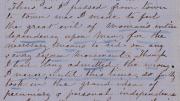Amid the COVID-19 lockdown this past spring, the Harvard libraries and University Archives launched an online crowdsourcing initiative: inviting volunteers to transcribe some 20,000 handwritten pages dating primarily from the seventeenth and eighteenth centuries. The ambitious effort is part of the multiyear digitization of manuscript diaries, letters, maps, documents, and notebooks in various languages (more than 700,000 pages) for the Colonial North America Project (fromthepage.com/harvardlibrary/colonial-north-america-harvard-university-archives).
Although written long ago, some notes remain surprisingly relevant. “This eve, I inoculated my son John, with matter taken this day from the legs of Billy Nothage, who has the small pox the natural way,” wrote Dr. John Jeffries, A.B. 1763, on June 14, 1775, describing first-hand experience with early smallpox inoculations. His son and other children were hospitalized on Rainsford Island in Boston Harbor.
Crowdsourced transcription projects have multiplied in the past decade as organizations seek ways to make handwritten documents available to readers. “It has been a long-held goal to eventually make these amazing materials more accessible through transcriptions and eventually even supporting annotations,” explains University archivist Megan Sniffin-Marinoff (see Harvard Portrait, January-February 2018, page 16).
Begun as a test project when staff members were forced to work remotely, this initiative was coordinated by Ross Mulcare, archivist for outreach, research, instruction and special projects, who developed guidelines and organized training via Zoom. “The goal of the project at the highest level,” he clarifies, “is to make this huge, rich cache of documents more accessible to researchers, not to create scholarly edited editions. The success of a crowdsourced project depends a lot on the crowd involved, and we’ve got a particularly talented group…contributing…, even with the difficulties of engaging with colonial-era handwriting and sometimes arcane subject matter.” To date, more than 300 collaborators—mostly from outside the current Harvard community—have participated, thus helping to advance the libraries’ scholarly and teaching missions.
Transcribing early letters requires sharp eyes, contextual knowledge, and patience. “The handwriting can be undecipherable at times and the abbreviations and misspellings are perplexing,” affirms Houghton Library assistant Francis A. Alix, whose interest in French Canadian history led him to transcribe fur-trading documents of the Hudson’s Bay Company from the 1680s, as well as a 1733 journal recounting a sea voyage to Canada. “However, the transcribing provides hours of enjoyment and learning opportunities.”
Recently the transcription offerings have expanded to include nineteenth-century documents concerning significant contemporary issues, such as Susan B. Anthony’s journal. In 1853, while traveling and speaking about women’s suffrage, temperance, and abolition, Anthony wrote the passage at right: “Thus as I passed from town to town was I made to feel the great evil of woman’s entire dependency upon man, for the necessary means to aid on any & every reform movement. Though I had long admitted the wrong, I never, until this time, so fully took in the grand idea of pecuniary & personal independence.”
Library staff members welcome the volunteers’ aid, even though quality control of crowdsourced transcriptions remains a time-consuming challenge. Houghton Library assistant Megan McNiff, for one, has become a “second pair of eyes,” painstakingly reviewing transcriptions to verify data and check adherence to the prescribed guidelines for handling line breaks and blank pages, illegible text, and certain abbreviations, for example. Recalling the c. 1800 diary of a traveling missionary, whose notes proved especially challenging, she marvels at the transcriber’s talent: “In some places the writing slanted almost off the page and was more of a scrawl compared to earlier entries; you could almost envision him writing on the go. He also had a tendency to omit punctuation and write in one long hurried rush of thought!”
“There is so much of the people captured in these documents,” McNiff adds. “It has felt like a window into folks leading very different lives, but to whom you could still relate. It’s been a very rewarding experience working on this project.”









